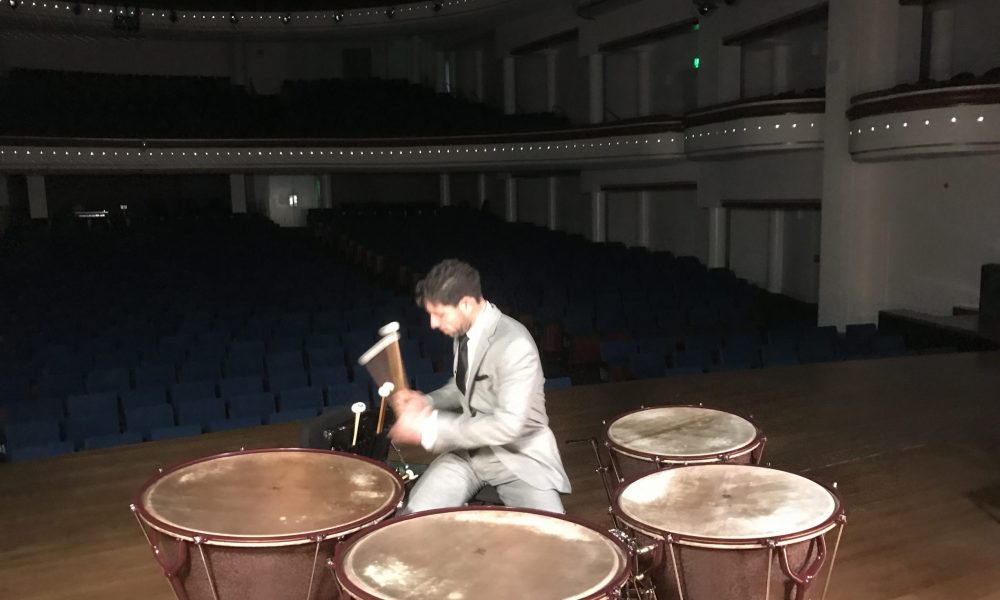

Today we’d like to introduce you to Leonardo Soto.
So, before we jump into specific questions, why don’t you give us some details about you and your story.
I was born in Santiago Chile, son of a drummer and an actress. My father is a self-taught musician and made a living to this day based on rhythms knowledge. When he realized that I was beating on everything around the house he told me that if I wanted to be a musician I had to be well educated and learn theory before I play the drums (his drums were off limits to me) so he took me to the conservatory to do a test and see if I actually had any ability … I was seven years old. After the test, I started my musical education at the conservatory of music of the University of Chile. After a few years and influenced by my neighborhood friends, I stopped going, I just wanted to play soccer like everyone else, Chile is not a place where you can do soccer, music, baseball, camp boy scouts, etc. etc. like kids do in the USA, you can only pick one and that is it. So I played soccer, but after a few years I realized I could not live without music. So I went back at age 13 and never stopped again.
When finishing high school my professional career started to develop, I got calls to play as a percussion extra with the National Symphony of Chile and the Santiago Philharmonic (which are the two major orchestras in the country), so I played a lot of Ballet, Opera and symphonic repertoire. That very first time my father took me to the conservatory at age 7 I remember going to see this youth orchestra rehearsal that was happening in the building, it was a beautiful day and the sun was shining through this big windows on the 11th floor of the building… I remember walking towards the room and hearing the sound of the timpani when I finally saw the instrument, the sunlight was hitting the copper bowls and those drums were shinning above everything else (at least to my eyes) and I thought THAT is what I want to play! The sound and the way they looked … I was in awe.
Every orchestra has only one Timpanist on the roster (unless you play in the Berlin or Vienna Philharmonic, or the Metropolitan Opera). Since Chile is a small country there were only two major orchestras where I could make a career and they both have great timpanist one of them being my teacher, so I knew that to make a career I had to go elsewhere. At age 21, the opportunity presented, this foundation auditioned students from Chile, Argentina, Brasil and Venezuela offering scholarship to go study at Carnegie Mellon University in Pittsburgh, PA. There were not many spots but thankfully my audition worked and I was chosen to go and study for two years. After finishing my first year the school offered a full scholarship to finish my education, which will keep me in the country for longer than two years, and I had a wonderful teacher who at the time was the timpanist of the Pittsburgh symphony.
Symphonic music has a very unique way to employ, to become a member of an orchestra you have to audition, against anyone who wants to audition, everything happens behind a screen anonymously, which means when you are auditioning the committee cannot see you and you cannot see them nor can you talk, they only hear what is coming from behind the screen, so you could be of any gender, age or have any educational background, bachelors, masters, doctorate or non at all, they will choose the person they think played the best and will fit the orchestra the best. Obviously having spent years educating yourself it helps tremendously, but really the only way to be employed in a Symphony orchestra is to play the best audition you can play and beat the competition (practice practice practice), it is sort of like a mix of taking the LSAT and playing Wimbledon Finals, there is a lot of intellectual knowledge, you must know the music inside out, not just your parts but everyone who’s playing with you, like a conductor does, as well as the physical execution. I mention the physical part because for one thing you have to travel at your own expense to wherever place the audition is being held, then auditions are divided in rounds, there is normally a preliminary round where everyone plays for about 15 to 20 minutes (or less if they really don’t like you), if you make it out of the round then you will play a semi-final round which is can be as long as 30 to 40 minutes of nonstop orchestral excerpts, then there is a final round and if they need it, you will play a Super final round, each round is longer than the other because they want to hear play everything, specially if the competition is tight, some orchestras vote to have an “Orchestra round” where they finally see you and they have you sit with the full orchestra and play. This can go sometimes to 3 or 4 days of back to back audition rounds.
I took my first audition for the Canton Symphony in Ohio after my second year at CMU, it was a small orchestra nearby, I was very excited to start this process and as it turns out I made the Finals!, so my teacher thought I was ready to start doing the audition circuit. Well, it turns out I would not make another finals for about three tears. Timpani audition are hard to come by, you have to wait for someone to retire for the one spot to open, and when they do everyone wants to audition for it, there are a lot of great music schools on the country filled with amazing students and musicians and we all want to go for that job. I finally won my first job five years of auditions and I got a spot with the Michigan Opera Theatre, Detroit Opera house, it’s an Opera orchestra that works about six months out of the year, since is not a full-time job, mostly students audition for it, two people made the finals and I ended winning it. During my years there, I kept taking lessons and practicing, also working other side jobs so I can make a living, it will take me six years of persistent work, practice and lessons. While I was there, I auditioned for Cincinnati orchestra, New York Philharmonic, Los Angeles Phil, San Diego Symphony (just to name the bigger ones) I made a few semi-finals but no finals. Then it payed off, I won a position with the Charlotte Symphony in NC. This was a much bigger job, almost Full time, it was possible to make a living.
To win an audition is almost like a perfect storm, is not always how well or not well you play it, there is travel involved, very little sleep sometimes, you walk into a new environment and you must play at the highest level, but even if you do play at your very best, you may just not be what they are looking for, maybe your sound is too bright, or too warm, maybe they are used to a different type of equipment (timpani sticks and such) different that the one a person may use, etc. etc. there are many different factors, so you can not get discouraged if you don’t succeed, you must keep at it no matter what happens, it is the only way.
What you look for in a musical career is high artistic standard, you love and respect what you do and you always want to do the very best you can, it is because of it that I kept on auditioning, I still felt that with such a long road I could do better, nothing wrong with Michigan Opera or Charlotte Symphony, they are both great jobs, but I wanted a big one, this time took me eight more years and a final number of 33 auditions to get to the Houston Symphony. My very first experience with this wonderful ensemble was a European tour, we have already recorded an album that will come out soon and we play wonderful music every week, there is a real high standard of music making with my colleagues and our music Director, everyone here is well respected. I can now put an end to my audition days and focus on music making every day. I am extremely thankful to be a full-time musician, a full-time Timpanist, to me is a true happy ending to many many years of a lot of work and what I call the heartbreaks of auditions, my goal is to help and motivate those who are on the same road.
Please tell us about Houston Symphony.
The Houston Symphony is one of the top orchestras in the Country and it has an international reputation, we get guess conductors and soloist of the highest caliber knows around the planet. being able to share the stage with such figures week after week is a tremendous demanding honor
If you had to go back in time and start over, would you have done anything differently?
Honestly, nothing, because the mistakes I made are the things that shape me to learn the lessons
Contact Info:
- Website: Houstonsymhony.org. leonardosoto.com
- Email: leonardorsoto@hotmail.com
- Instagram: leonardochileno
- Facebook: Leonardo Soto
- Twitter: @r_leonardosoto

Suggest a story: VoyageHouston is built on recommendations from the community; it’s how we uncover hidden gems, so if you or someone you know deserves recognition please let us know here.


















